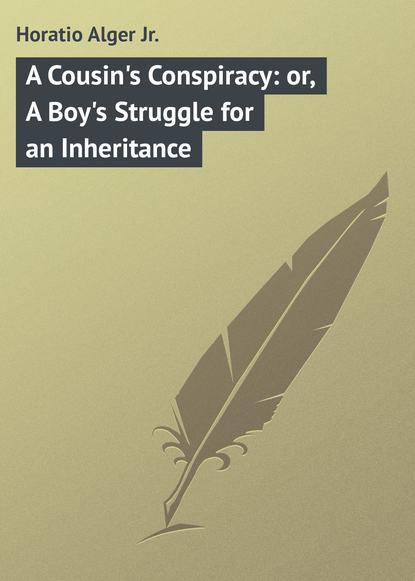По всем вопросам обращайтесь на: info@litportal.ru
(©) 2003-2024.
✖
A Cousin's Conspiracy: or, A Boy's Struggle for an Inheritance
Настройки чтения
Размер шрифта
Высота строк
Поля
“Well, no; I draw the line there. As a Quaker I could not consistently join a band of robbers.”
“Who are you?” asked Fox abruptly. “You weren’t raised around here.”
“No.”
“Where, then?”
“I came from Iowa.”
“What is your name?”
“My friend, I haven’t any visiting cards with me. You can think of me as the Quaker detective.”
“Then I will come to business. You want a thousand dollars?”
“You are correct there.”
“Then I will show you a way to get it.”
“I know one way already.”
“You mean by delivering me up?”
“Yes.”
“That would not suit me. Let me go and I will give you a thousand dollars.”
“Have you got it with you?”
“No, but I can arrange to give it to you within a week. You see,” added the outlaw dryly, “I have been prosperous in my business and can spare that sum in return for giving me my liberty.”
“I am afraid, friend Fox, that my chance of securing the money in that way would be slender.”
“I am a man of my word. What I promise, I will do.”
“If you have so much money, why did you want to take the five hundred dollars of my friend here?”
“It was all in the way of business. Well, what do you say?”
“That I won’t trust you. If I should take your thousand dollars for releasing you I should be as bad as you are.”
“Very well; drive on then,” said the outlaw sullenly.
In less than an hour Ezekiel Mason’s home was reached. When they drove into the yard it made quite a sensation. Mrs. Mason and the hired man stood with mouths agape.
“Who have you got there, Ezekiel?” asked his wife.
“One of the Fox brothers!” answered the farmer in an important tone. “Me and my friend here took him.”
Luke smiled and so did the prisoner, uncomfortable though he was.
“It would have taken a dozen like that fool to have captured me,” he said in a low voice, but only Luke heard him.
CHAPTER XI
UNDER WATCH AND WARD
THE farmhouse was built after the model of many similar houses in New England. It was of two stories, with the front door in the center and a room on each side. Over the two stories was an unfurnished attic.
“Have you a secure place to keep our friend here?” asked Luke.
The farmer paused before he answered.
“I might put him in the attic,” he said.
But here his wife interfered.
“I couldn’t sleep if he were in the house,” she said.
“Why not?” asked Luke. “You see he is securely bound and will be as helpless as a child. Will you show me the attic?”
“Follow me,” said the farmer.
They went up two flights of stairs and found themselves in a long room, the whole width of the house. Through the center rose the chimney. The sloping roof was not plastered. The only furniture consisted of a cot bedstead and a chair.
“Is the attic occupied by any of the family?” asked Luke.
“Not generally. When I hire an extra hand at harvest time he sleeps there.”
“But at present there is no one occupying it?”
“No.”
“Then I suggest that the bed will prove a good resting place for our friend below. I have no doubt he has often found himself in lodgings less comfortable.”
“But,” said Mrs. Mason nervously, “if he should get free during the night he might murder us all in our beds.”
“There is little chance of that. When your husband bound him he did a good job. I wouldn’t undertake to get free myself if I were bound as securely.”
“That’s so!” said the farmer, pleased with the compliment. “He can’t get away nohow.”
Over in the corner there were a couple of horse blankets which seemed to offer a comfortable resting-place. Luke Robbins eyed them thoughtfully.
“I have an idea,” he said. “Let the outlaw lie there and one of us can occupy the bed. Then he won’t be able to try any of his tricks.”
“I would rather not sleep there,” observed the farmer nervously. “I couldn’t sleep in the same room with one of the Fox brothers.”
“Then if you couldn’t sleep there you are just the man we want. You will always be on the watch and can frustrate any attempt to escape.”











